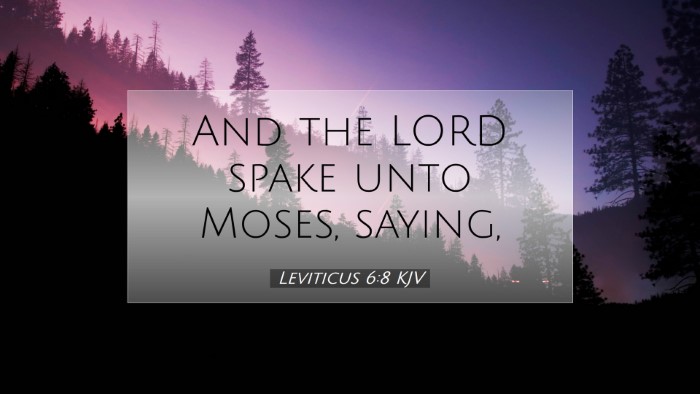Commentary on Leviticus 6:8
Verse: Leviticus 6:8 (KJV) - "And the LORD spake unto Moses, saying,"
Introduction
Leviticus 6:8 serves as a crucial juncture in the Mosaic law, signaling God's instructions to Moses regarding the duties and responsibilities of the priests concerning offerings and the service of the sanctuary. The Lord's direct communication underscores the seriousness of the sacrificial system and its significance in maintaining the covenant relationship between God and Israel.
Divine Communication
Matthew Henry emphasizes that God's speech is authoritative and commands obedience. The phrase "the LORD spake unto Moses" signifies the importance of divine revelation in guiding the leaders of Israel. It reflects God's desire to maintain a structured worship environment where His holiness is honored.
Albert Barnes adds that this communication is not merely informational but serves as a directive for action, highlighting the priestly duties essential for the spiritual welfare of the community. The role of Moses as a mediator is pivotal, ensuring that God’s will is conveyed accurately to the people.
The Nature of Sacrifices
The context of Leviticus addresses various offerings, and the instructions following this verse clarify the types of sacrifices and their purposes:
- Burnt Offerings: Signifying total devotion to God.
- Grain Offerings: Acknowledging God's provision.
- Sin Offerings: Addressing transgressions against God.
Adam Clarke points out that these offerings demonstrate the seriousness with which sin must be approached and the necessity of atonement. It also reflects God's provision for restoration and reconciliation through prescribed means, emphasizing the importance of adherence to divine statutes.
Liturgical Significance
This verse introduces essential elements of Israel's worship practices comprehensively laid out in the subsequent texts. Matthew Henry notes that the meticulous guidelines serve to preserve the sanctity of the worship space, and God’s directives ensure that offerings are presented correctly to avert the wrath that could arise from improper worship.
The Role of the Priesthood
According to Albert Barnes, the responsibility placed on the priests is immense; they are the intermediaries who facilitate the relationship between the Israelites and God. Their service in the temple is not only a job but a vital act of stewardship over the sacred responsibilities outlined by the Lord. Properly executed rituals become essential to maintain the nation’s favor with God.
Moral and Ethical Implications
This passage invites deeper reflection on obedience and submission to divine authority. Adam Clarke reflects on the broader implications of God's commandments, noting that they invite believers, then and now, to a life of holiness and reverence. The adherence to God's message shapes the moral fabric of the community, calling them to distinctive behavior that honors their covenant identity.
Concluding Thoughts
As we explore Leviticus 6:8, it becomes evident that God's communication with Moses is foundational for understanding the sacrificial system, worship practices, and the gravity of sin in relationship to holiness. This teaches pastors, theologians, and scholars about the importance of careful adherence to God's commands and the spiritual responsibilities entrusted to leaders in the faith community.
The ceremonial laws outlined here serve not only as a historical context but also as a paradigm for modern worship and accountability before God. Understanding their significance can enrich one’s pastoral duties and theological studies—bringing a deeper appreciation for the grace extended through these ancient yet timeless practices.


